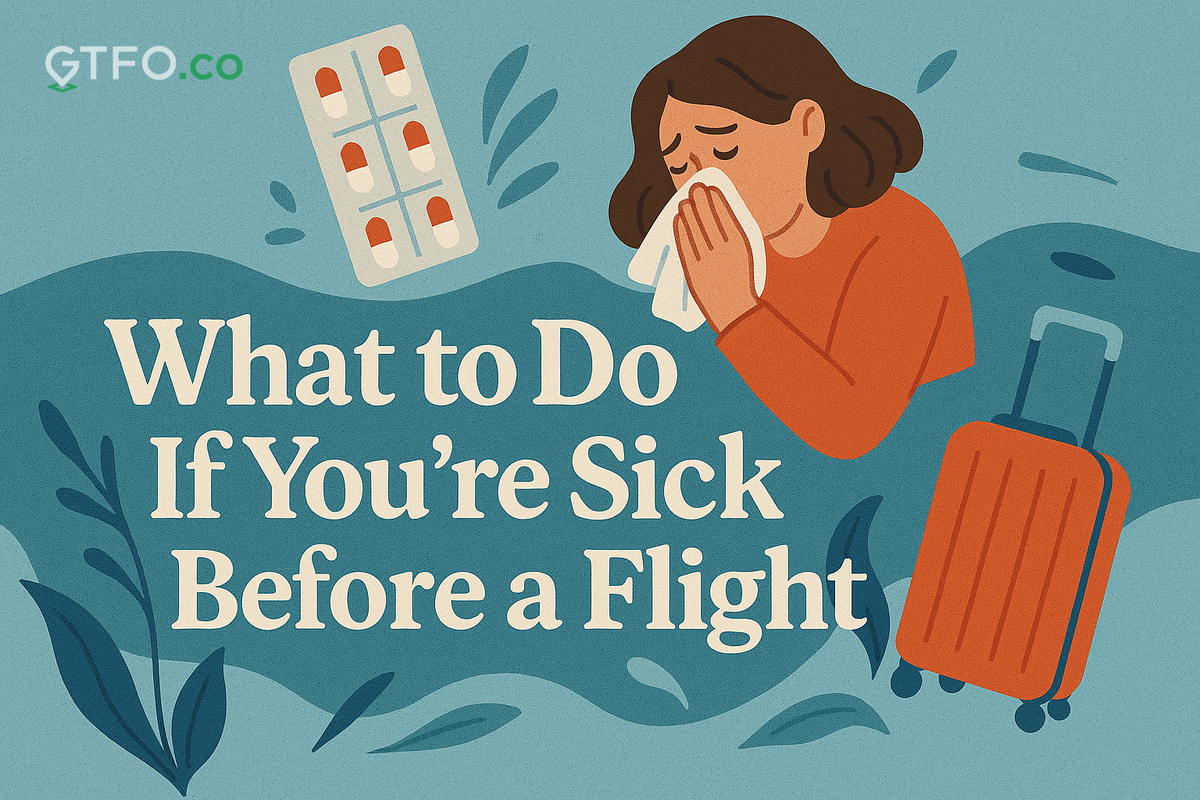What to Do If You're Sick Before a Flight: Real Advice, No Panic
Feeling sick before a flight sucks. Whether it's a mild cold, a stomach bug, or something worse, here’s what to consider before you head to the airport, what your options are, and how to take care of yourself (and others).

What to Do If You're Sick Before a Flight
If you're sick before a flight, just try to understand how bad it really is at first. For a mild cold or minor illness, you may still be able to fly, just take precautions and be smart about hygiene. But if you're running a fever, contagious, or feel too weak to function, you should seriously consider postponing your trip. Talk to your airline about rebooking, contact your doctor if needed, and don’t risk making yourself worse or spreading it to others.
Key Takeaways
- Figure out what you’re dealing with: A sniffle is not the same as a fever or vomiting.
- Don’t power through if you’re seriously ill—you’ll risk your health and others’.
- Check your airline’s change or cancellation policy; many offer flexibility for health issues.
- Bring the right meds and stay hydrated if you decide to fly with a minor illness.
- Wear a mask and wash your hands often to reduce the chance of spreading anything.
- Have a backup plan in case you need to reschedule or adjust your itinerary.

Step One: Get Real About How Sick You Are
Before anything else, figure out how bad it is. Not every sniffle means canceling a flight. But if you're hoping to power through something serious, hit pause.
Ask yourself:
- Do I have a fever?
- Am I vomiting, have diarrhea, or severely dehydrated?
- Do I feel well enough to get through security, fly, and get to where I need to be on the other end?
- Could I be contagious?
If the answer is yes to any of those red flags, it’s probably not worth flying. Your body is already dealing with stress, maybe adding dry cabin air, altitude, and germs from 200 other passengers isn't that great of an idea.

Step Two: Check Airline Policies
Many airlines have improved their flexibility since COVID, especially for health-related changes. Here's what to do:
1. Log into your airline account
Find your reservation and check change or cancellation options. Some airlines allow you to:
- Rebook without a fee.
- Get a flight credit.
- Cancel and request a partial refund (if you booked the right fare type).
2. Call customer service
If your illness is serious, call and explain. Airlines won’t always ask for a doctor’s note, but it doesn’t hurt to have one if you want a refund or rebooking with no fee.
3. Check travel insurance
If you bought travel insurance, now’s the time to use it. Most policies cover illness-related cancellations, especially with documentation.
Step Three: Talk to Your Doctor
If you’re unsure whether it’s safe to fly, don’t guess, call your doctor. They can:
- Assess your symptoms.
- Advise you on whether flying is risky.
- Write a note for the airline if needed.
- Suggest medications to help you manage symptoms during the flight.
If you’re immunocompromised, have a chronic illness, or are recovering from something major, that expert opinion is a must.

Step Four: If You’re Flying Sick (and It’s Safe), Be Smart
Let’s say you’ve got a mild cold or sinus pressure. You're not contagious anymore, or you've tested negative for anything serious. You're still flying, fine, but you need to make it easier on yourself and others.
Here’s what to do:
1. Wear a mask
It protects other passengers (and you). It also keeps your dry-air cough from scaring people nearby.
2. Bring meds in your carry-on
- Painkillers
- Decongestants (if you’re stuffed up).
- Anti-nausea meds.
- Electrolyte packets or lozenges.
- Saline nasal spray or throat spray.
3. Hydrate like it’s your job
Cabin air dehydrates you fast, sick or not. Bring a water bottle and keep sipping.
4. Pack hand sanitizer and tissues
Use them often. Wipe down your seat area too—armrests, tray, screen, etc.
5. Get a window seat
Less movement = more chances to rest. Plus, you won’t be climbing over people every time you need to blow your nose or take meds.
6. Board early if possible
If you need extra time or want to avoid crowds, see if you can board early, especially if you're not feeling steady on your feet.

Common Illnesses and Flight Considerations
Here’s how different types of sickness can affect your ability to fly—and what to watch for.
Colds
- Can fly if symptoms are mild.
- Use decongestants before takeoff/landing to avoid ear pain.
- Keep tissues and sanitizer handy.
Flu or COVID-like symptoms
- Don’t fly. You’re contagious and too sick to travel.
- Get tested.
- Reschedule and rest.
Stomach issues
- Mild nausea? You might manage.
- Vomiting or diarrhea? Do not get on a plane. Seriously.
Ear infections or sinus pressure
- Flying can be painful, even dangerous.
- Decongestants may help, but talk to a doctor.
- If your ears feel blocked now, the pressure during descent could be awful.
Fever
- Big red flag. Flying with a fever puts stress on your heart, immune system, and makes you more likely to pass something along.
- Skip the flight.

If You Need to Cancel or Delay
Missing a flight sucks. But pushing through when you're sick can ruin your whole trip or make you sicker. If you decide not to fly:
1. Cancel as soon as possible
The sooner you cancel, the better your chances of getting a partial refund or credit.
2. Contact hotels and activities
Many will let you rebook if you explain your situation. A quick, polite message can go a long way.
3. Update travel companions
If you're flying with others, keep them in the loop. You don’t want to risk getting them sick either.
Mental Game: Let Go of the Guilt
Travel plans can feel high-stakes. You’ve booked time off, made plans, maybe even promised someone you’d be there. It’s normal to feel guilty about pulling out last-minute.
But here's the deal: getting sicker or making others sick doesn’t help anyone. Prioritize your health. Travel will always be there. And being the person who didn’t bring norovirus to the whole tour group? That’s heroic.

Tips to Avoid Getting Sick Before a Flight
Sometimes it’s just bad luck. But you can stack the odds in your favor with a few small habits before your trip:
- Start sleeping well a few days before. Fatigue lowers immunity.
- Boost hydration—start drinking more water at least 48 hours pre-flight.
- Wash your hands constantly—especially in airports.
- Avoid last-minute stress if possible. Stress hits your immune system hard.
- Consider supplements like vitamin C or zinc if that’s your thing—but nothing replaces sleep, rest, and clean hands.
Bottom Line
If you’re sick before a flight, the first thing to do is slow down and assess. Some symptoms can be managed safely. Others mean staying home is the best move. Don’t assume you have to “push through.” You have options, and airlines are often more flexible than you’d think with health concerns.
If you do fly, take steps to protect yourself and everyone around you. Be the person other passengers are glad to sit near, not the one coughing without covering.
Common Questions About Flying While Sick
Q: Can I fly with a cold?
Yes, if symptoms are mild. Bring meds and try to sit by the window to rest.
Q: Should I cancel my flight if I have a fever?
Yes. Flying with a fever is risky to your health and inconsiderate to others.
Q: Will airlines refund my flight if I’m sick?
Depends on the airline and your ticket type. Many now offer flexible change policies or credits, especially if you have a doctor’s note.
Q: What if I start feeling sick right before boarding?
Let a gate agent know. You may be able to rebook. It’s better than flying while unwell.
Q: How do I not get others sick if I fly with a cold?
Wear a mask, wash your hands often, sanitize your area, and avoid touching your face.
Feeling off before a trip? Check in with your body—and your airline





